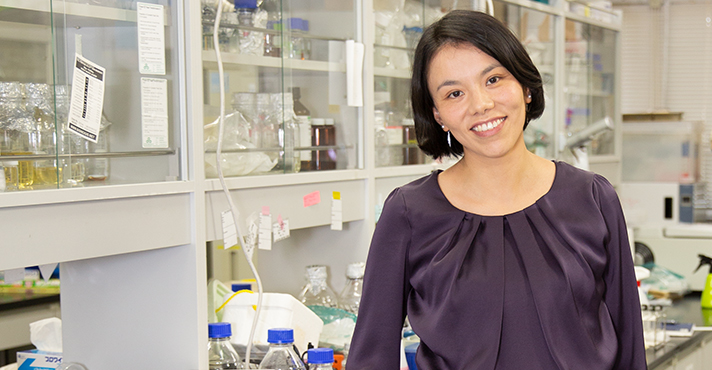
Dr. Ery Odette Fukushima, Associate Professor, Division of Advanced Science and Biotechnology, Graduate School of Engineering
1. My research field

Plants produce specialized metabolites that we commonly use as medicines, industrial materials, etc. Triterpenoids are one group of these specialized metabolites. Some examples of triterpenoids are oleanolic acid (the white powder that covers grapes) and glycyrrhizin (the sweetener compound used in a number of snacks). Both compounds exhibit important pharmacological properties, such as anti-inflammation, antioxidant, anti-ulcer, and anti-HIV. However, little is known about the production of these compounds in plants, which are often scarce and restricted to certain plant species. In my work, I study how triterpenoids are produced in plants (the enzymes responsible for their biosynthesis), how different they are from each other and how diverse they are (their evolutionary relationships), and why plants produce them (their possible roles in plants). Once I obtain this information (the plant triterpenoid biosynthesis mechanism), I transfer it from plants to yeast in order to increase their amounts and diversity. For all of this research, I am using techniques related to metabolomics, transcriptomics, molecular biology, plant tissue culture as well as genome editing techniques. Recently, I have also been studying the potential biological activities of these compounds and the structural features involved in these activities.

2. Research environment at OU
From 2013, I was able to be part of a tenure-track system that allowed me to have a stipend for the last 5 years to buy equipment necessary to perform my research. Since I share the lab with senior professors, I have access to other important equipment and research materials as well. I also have the support of my co-workers and supervisors when needed as well as the help of enthusiastic students. Even though the national budget allocated to support scientific development is continuously decreasing, there are incentives for scientists, especially women, to apply for different grants.
Still, in order to provide more chances for innovation, changes such as allowing researchers to perform research more freely and independently (e.g. less administrative work) and diversifying the personnel (e.g. provide an English-speaking environment and incorporate more women and international staff) will be necessary.
3. Impression of the education at OU
There are classes where the teacher explains a basic topic in detail and those where the teacher talks about his/her own research and the application of different techniques. Occasionally, we also have seminars given by visiting professors from other universities and companies. All of the necessary materials and guidance are provided, and the libraries provide wide access to several academic journals and books. Moreover, the academic staff are willing to help students at any time. However, most outcomes depend on the students themselves who will shape their own careers. From my experience, the success of a student depends on his/her motivation, discipline, good networking skills and continuous curiosity to learn new things.
4. Campus diversity
Osaka University has a growing international community. 10% of my faculty (Engineering) is made up of international students from about 50 countries. What’s more, about a quarter of the Department of Biotechnology consists of international students, and international staff members were also recently incorporated thanks to the cross-appointment system.
In this sense, I think we are making massive efforts to increase internationality at Osaka University; however, more measures should be taken in order to not only gain more individuals from overseas, but also to create a global community at the university. This will surely contribute to the development of the university and of the science generated at this institution.
I also feel that the issue of gender balance has begun to be taken seriously at the university. As I mentioned before, international staff members have been recently incorporated at the Department of Biotechnology, and they are all women. This is surely increasing diversity in terms of gender balance; however, there are currently no women (neither from Japan nor from overseas) appointed as permanent full professors. Thus, directions only discussed at this level (e.g. professors assembly, faculty representatives assembly, etc.) are decided entirely by men.
In my opinion, measures should be taken to increase not only the number but also the representation of women, international staff members, and others at the institution. The university will surely benefit from the diversity generated and become an even better place to study and work.
5. Living environment compared to the past

The first time I came to Japan, I attended a public elementary school and experienced bullying just because I spoke in Spanish with my Hispanic friends. Now, my mentor introduces me as someone who is multilingual, as I can speak Japanese, English and Spanish.
At my 3-year-old son’s nursery school, his friends are curious about the “strange language” he speaks, and several of them, including teachers, have learned a few words in Spanish.
These examples clearly show that Japanese society has positively changed during the last few decades. Still, as a whole, the international community makes up less than the 2% of the population of Japan. More measures in policy, migration, etc. are necessary to increase the international population and thus, create a global community that will contribute to the development of Japan.
Text: Junko Kimura/Edit: Christopher Bubb